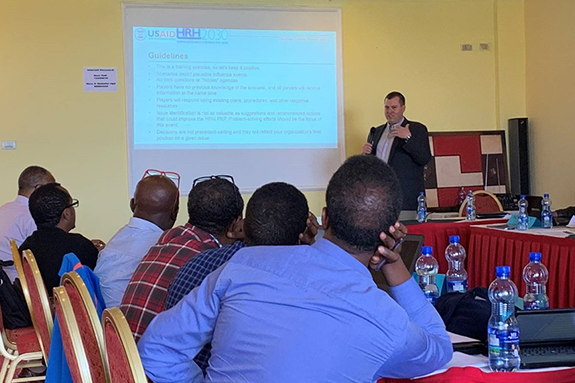
31 May Ethiopia Reaches One Health Milestone in Pandemic Preparation
Last month, Ethiopia reached a milestone in its One Health efforts, successfully conducting a Highly Pathogenic Avian Influenza (HPAI) Preparedness and Response Plan (PRP) Tabletop Simulation Exercise that illustrated the country’s readiness to combat an outbreak of this potential pandemic threat.
One Health efforts—the interdisciplinary health interventions that address how human illnesses are connected to diseases from animals and the environment—are critical in Ethiopia, where the economy and livelihoods depend heavily on agriculture and livestock. The HRH2030 One Health activity in Ethiopia works with a variety of key ministries and organizations to ensure that One Health multisectoral coordination and collaboration is in place. HRH2030 organized and facilitated the HPAI Tabletop Simulation Exercise, the first of its kind in Ethiopia, in partnership with the Ethiopian Emerging Pandemic Technical Working Group (EPT-TWG) and Ohio State University’s Global One Health Initiative. The HPAI PRP tabletop simulation, a scenario-based emergency exercise in which participants tested and assessed draft plans and procedures, took place May 24-25 and brought together 27 representatives from across a variety of sectors including agriculture, environment, wildlife, and health, to test the Government of Ethiopia’s HPAI Preparedness and Response Plan.
While Ethiopia has not yet faced an HPAI outbreak, there have been scares and misdiagnoses in recent years that have created panic among farmers and healthcare workers. HPAI occurs mainly in birds and is highly contagious. An HPAI outbreak would shock the country’s poultry sector, which consists primarily of traditional, small-scale household operations, as birds would have to be culled to control the outbreak, resulting in severe economic losses. The HPAI Preparedness and Response Plan had been completed in 2018, but to ensure its viability, it was paramount that it be tested for its practicability.
Dr. Andrew Bowman of Ohio State University developed realistic scenarios that tested Ethiopia’s proposed response to a HPAI outbreak globally, regionally, and then domestically. The exercise divided participants into two groups comprised of different sectors and had the group members work together to respond to each of the scenarios. Evaluators from the Food and Agriculture Organization (FAO) and Environment, Forest and Climate Change Commission observed the groups’ responses, noting whether their answers were in line with the draft plan. While there were some updates and revisions required, the group members clearly understood where the gaps were and what needed to be done to address them.
“The scenarios that we went through captured all of the elements of emergency preparedness and response,” said Dr. Getachew Dinede of the Ministry of Agriculture, at the conclusion of the exercise. “We now all have common understanding of the plan. This tabletop exercise has given us a better framework for working together during an outbreak. There are gaps that we now realize because of the scenarios. We need to produce guidelines, SOPs, enforce legal frameworks, and even produce legal frameworks. This has been a great way to share experiences and information among the ministries.”
Dr. Getachew Gari of the FAO, one of the evaluators, noted a particular finding of the exercise. “This weekend we looked at the whole emergency response cycle including recovery. What I’ve learned is that the document focused mainly on the animal aspects, as HPAI is from poultry and migratory birds. We didn’t consider what would happen if the disease comes into the country through people,” he said, citing that as a gap to be addressed.
Dr. Abraham Ali, the chair of the EPT-TWG, agreed that the exercise was a good test of the plan, saying, “The HPAI Tabletop exercise helped us update our preparedness and response plan based on reality and ensures that we can respond effectively to an HPAI pandemic.”
With this major milestone achieved, and a tested, proven plan in place to address HPAI outbreaks in Ethiopia, HRH2030 One Health will continue to work with the key stakeholders to strengthen capacity to effectively prevent, detect, and respond to other zoonotic disease threats, and ultimately ensure country ownership and sustainability of these efforts.
Photo: Dr. Andrew Bowman makes a presentation during the HPAI Preparedness and Response Plan Tabletop Simulation Exercise. Photo credit: Grace Tran for HRH2030





